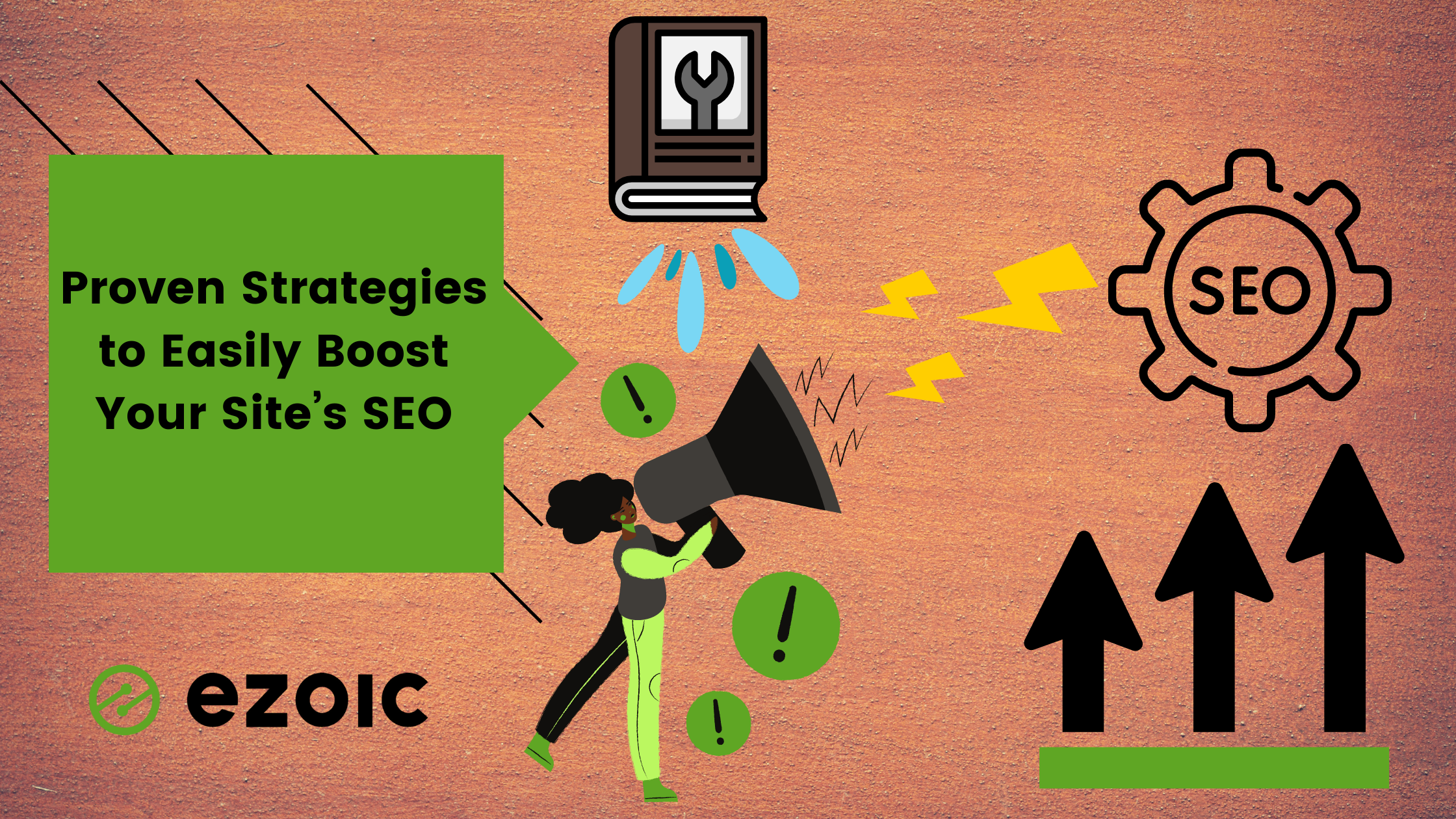
3 Proven Strategies to Easily and Quickly Boost Your Site’s SEO

Get helpful updates in your inbox
High-quality SEO doesn’t have to be complicated.
It’s no secret that without at least a serviceable SEO strategy for your site, your traffic will never be as high as it could be. The massive majority of your site’s traffic, especially at first, can come from organic sources like search engines. Without it, your site probably won’t evolve into a top destination for your audience.
Many content creators feel uncomfortable, even discouraged about using SEO. It’s understandable — search engines like Google keep their search algorithms notoriously private, and constantly change throughout the years (it’s estimated Google’s algorithm changes 500-600 times a year!). What worked last year might be obsolete by now. What works tomorrow might not work next quarter.
But there’s still hope. We have nearly 20 years of SEO data and algorithm data to pull from, and we can see some obvious similarities and consistent truths about how to apply great SEO. Furthermore, we can navigate SEO through the big picture of what search engines are trying to do: give their users the most relevant, accurate, helpful information from the world’s most relevant authorities.
Here are some proven strategies to quickly and easily boost your site’s SEO in the most evergreen and long-standing methods possible.
Use a Simple SEO Plugin to Get Easy, Low-Hanging Fruit

One of the reasons why so many content creators feel so much trepidation about applying SEO strategies is because it can feel like something a software engineer or computer programmer should do. SEO can feel like you need to be a machine that talks to other machines, going into the code and meta data of your site.
Part of this disconnect happens when content creators don’t fully grasp what SEO really is. When a user types in a search query on Google (say, “how to ride a bicycle”), Google instantly searches every known resource and website they’ve indexed, looking for countless traits and identifiers of the site to determine the best possible answers to the search query. Google isn’t just searching for your content know-how, they’re combing through all the metadata of your site and connecting every possible dot you give them to determine your site’s relevancy.
This is a lot of work for any content creator to prepare for, but it’s extremely important for the well-being of your site — you don’t want Google to take a look at your site and determine it’s not helpful, thereby not showing it to anyone.
Fortunately, there are countless SEO plugins you can integrate into your site, many of them completely free, that handle all this work for you and guide you with sound SEO principles. You’re fighting data with data, and these plugins help you apply smart SEO so you don’t have to figure everything out yourself.
Here’s how it works. SEO plugins quickly assess your site, and assess your content before you publish it. Then (and here’s where they’re really helpful) they immediately pull up the places within your site where you can input the metadata for your content and site. They usually have recommendations or a score system so you know how well your article or content will probably perform.
If your site has glaring metadata information missing, the plugin points it out and helps you place search engine optimized information there. If you forgot to input important SEO information, the plugin reminds you (or fills it out for you).
Finding and installing a simple SEO plugin only takes a few minutes, and it does a massive amount of SEO work for you and your site — probably for free. If you’re not using one for your site, we recommend you get one now and start using one from now on.
Focus on Ranking For Long Tail SEO Search Terms, Then Graduate To Short Tail
When you first start out as a content creator, you’re going against countless experts in your field with years of high-ranking, helpful content you haven’t even written about yet. These are the sites Google trusts the most, and their top-tier SEO strategies usually result in Google ranking their site on the first page of the most popular search terms.
Instead of trying to compete with these goliaths and their arsenal of SEO strategies, focus on ranking highly for long tail keywords, less searched-for queries that have less competition.
Short tail keywords are usually the most searched-for terms, usually three words or less. Think “running shoes” or “best car deals” or “real estate.” These are massively popular search terms, and the largest content creators in your industry are likely trying very hard to rank highly in Google for each term because of all the traffic they get.
Smaller sites don’t have the resources, clout, or proof yet that they can compete with these giants, and Google will almost always show these other, more trustworthy sites over smaller, unproven ones. Instead, identify some less searched-for long tail keywords, search queries that don’t have as much traffic (but also far less competition). Think phrases like “how to find good trail running shoes” or “when should I go buy a car” or “real estate strategies for Los Angeles realtors.”
If you can begin ranking highly for these long tail search terms, you’ll not only get more traffic, but Google will also begin to notice your clout and expertise appears to be growing. If Google sees users consistently staying on your page for a while after clicking your site for a long tail search query, Google will begin to afford you more chances to rank higher for other search terms. You need to walk before you can run, and you need to rank for long tail keywords before you graduate into short tail.
SEO Hack: Optimize Your Older, Highest-Performing Posts

Odds are, you probably have some pieces of content that performed far better than the rest. For a variety of reasons, these pieces of content are the ones that worked and got your lion’s share of traffic.
Instead of taking your win and moving on, you can go back to these old posts and optimize them, which allows you to continue to get traffic over time. There are several ways to do this. For example:
- Make the content as evergreen as possible, so current and future traffic can also benefit from it
- Include high-ranking and relevant keywords/key phrases to further boost your content’s SEO
- Cite higher-quality sources with relevant links
- Fill in the metadata information like title tags, header tags, meta description, etc.
These posts worked, and they can continue to work if you optimize them with high-quality SEO strategies, helping them continue to appear in search engine results (they’re also a great hint at what your audience wants more of). These kinds of behaviors can help your content move up from say, page five of Google to page two, or even to page one. This could greatly increase your site’s traffic in the immediate future and the long-term, as Google will be more open to showing more of your site in search engine results.
The tricky part about SEO is that you’re never really “done”; you can endlessly tweak, optimize, or edit little parts of your content to make it a bit more SEO friendly. But algorithms, market trends, and human behavior always change — there’s no such thing as perfect SEO. At least not for long.
Instead, do what you can. Make good posts great by optimizing them with better SEO strategies. Many content creators still earn significant income from content they posted months, even years ago. Take care of these high-performing posts, and they’ll continue to rank highly as time goes on.
Bonus Tip: Harness the Power of Social Media for SEO
While optimizing your website for search engines is crucial, don’t overlook the impact of social media on your SEO efforts. Social media platforms can significantly amplify your content’s reach and increase your website’s visibility in search engine results.
First and foremost, make sure to promote your content on relevant social media channels. Share your articles, blog posts, and other valuable resources with engaging captions and eye-catching visuals. Encourage your followers to engage with your content by liking, commenting, and sharing it with their networks. Increased social media engagement sends positive signals to search engines, indicating that your content is valuable and worth ranking higher.
Additionally, social media profiles often rank highly in search engine results, especially for branded searches. Optimize your social media profiles by including relevant keywords in your bio, description, and posts. Use hashtags strategically to increase the discoverability of your content.
Another SEO benefit of social media is the opportunity for link building. When your content gets shared and linked to on social media platforms, it generates backlinks to your website. Backlinks are a crucial factor in search engine rankings, as they indicate that other websites find your content valuable and trustworthy. Encourage influencers, industry leaders, and satisfied customers to share your content and link back to your website.
Remember to monitor and analyze your social media efforts to determine which platforms and content types resonate the most with your audience. Adjust your strategy accordingly and continue to leverage social media to boost your SEO success.
By combining effective SEO practices with a robust social media presence, you can drive more organic traffic to your website and establish your brand as a trusted authority in your industry.
In Conclusion: Top Tips for Boosting your SEO
If you write high-quality content but apply poor SEO strategies…there’s a high chance no one will ever really see your content.
If you write poor-quality content but apply high-quality SEO strategies…you might get more traffic, but those visitors probably won’t stay on your site once they realize it’s not that helpful.
If you want a top-performing site, you need both: high-quality content and high-quality SEO strategies. Fortunately, you don’t have to figure out everything yourself. Use free tools that apply high-performing SEO strategies to your content without needing to be an SEO expert yourself.

Anthony Moore is a writer, speaker, and coach. He's helped hundreds of entrepreneurs create successful businesses, and has gained over 7 million views for his work on entrepreneurship, personal growth, and productivity.
Featured Content
Checkout this popular and trending content

Ranking In Universal Search Results: Video Is The Secret
See how Flickify can become the ultimate SEO hack for sites missing out on rankings because of a lack of video.
Announcement

Ezoic Edge: The Fastest Way To Load Pages. Period.
Ezoic announces an industry-first edge content delivery network for websites and creators; bringing the fastest pages on the web to Ezoic publishers.
Launch

Ezoic Unveils New Enterprise Program: Empowering Creators to Scale and Succeed
Ezoic recently announced a higher level designed for publishers that have reached that ultimate stage of growth. See what it means for Ezoic users.
Announcement
